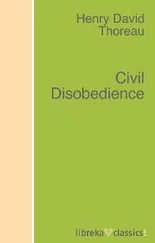the beans there. The dead and for the most part unmerchantable wood
behind my house, and the driftwood from the pond, have supplied the
remainder of my fuel. I was obliged to hire a team and a man for the
ploughing, though I held the plough myself. My farm outgoes for the
first season were, for implements, seed, work, &c., $14.72½. The seed
corn was given me. This never costs anything to speak of, unless you
plant more than enough. I got twelve bushels of beans, and eighteen
bushels of potatoes, beside some peas and sweet corn. The yellow corn
and turnips were too late to come to any thing. My whole income from
the farm was $ 23.44 Deducting the outgoes,........... 14.72½ There are left,................. $ 8.71½,
beside produce consumed and on hand at the time this estimate was made
of the value of $4.50,—the amount on hand much more than balancing a
little grass which I did not raise. All things considered, that is,
considering the importance of a man’s soul and of to-day,
notwithstanding the short time occupied by my experiment, nay, partly
even because of its transient character, I believe that that was doing
better than any farmer in Concord did that year.
The next year I did better still, for I spaded up all the land which I
required, about a third of an acre, and I learned from the experience
of both years, not being in the least awed by many celebrated works on
husbandry, Arthur Young among the rest, that if one would live simply
and eat only the crop which he raised, and raise no more than he ate,
and not exchange it for an insufficient quantity of more luxurious and
expensive things, he would need to cultivate only a few rods of ground,
and that it would be cheaper to spade up that than to use oxen to
plough it, and to select a fresh spot from time to time than to manure
the old, and he could do all his necessary farm work as it were with
his left hand at odd hours in the summer; and thus he would not be tied
to an ox, or horse, or cow, or pig, as at present. I desire to speak
impartially on this point, and as one not interested in the success or
failure of the present economical and social arrangements. I was more
independent than any farmer in Concord, for I was not anchored to a
house or farm, but could follow the bent of my genius, which is a very
crooked one, every moment. Beside being better off than they already,
if my house had been burned or my crops had failed, I should have been
nearly as well off as before.
I am wont to think that men are not so much the keepers of herds as
herds are the keepers of men, the former are so much the freer. Men and
oxen exchange work; but if we consider necessary work only, the oxen
will be seen to have greatly the advantage, their farm is so much the
larger. Man does some of his part of the exchange work in his six weeks
of haying, and it is no boy’s play. Certainly no nation that lived
simply in all respects, that is, no nation of philosophers, would
commit so great a blunder as to use the labor of animals. True, there
never was and is not likely soon to be a nation of philosophers, nor am
I certain it is desirable that there should be. However, _I_ should
never have broken a horse or bull and taken him to board for any work
he might do for me, for fear I should become a horse-man or a herds-man
merely; and if society seems to be the gainer by so doing, are we
certain that what is one man’s gain is not another’s loss, and that the
stable-boy has equal cause with his master to be satisfied? Granted
that some public works would not have been constructed without this
aid, and let man share the glory of such with the ox and horse; does it
follow that he could not have accomplished works yet more worthy of
himself in that case? When men begin to do, not merely unnecessary or
artistic, but luxurious and idle work, with their assistance, it is
inevitable that a few do all the exchange work with the oxen, or, in
other words, become the slaves of the strongest. Man thus not only
works for the animal within him, but, for a symbol of this, he works
for the animal without him. Though we have many substantial houses of
brick or stone, the prosperity of the farmer is still measured by the
degree to which the barn overshadows the house. This town is said to
have the largest houses for oxen, cows, and horses hereabouts, and it
is not behindhand in its public buildings; but there are very few halls
for free worship or free speech in this county. It should not be by
their architecture, but why not even by their power of abstract
thought, that nations should seek to commemorate themselves? How much
more admirable the Bhagvat-Geeta than all the ruins of the East! Towers
and temples are the luxury of princes. A simple and independent mind
does not toil at the bidding of any prince. Genius is not a retainer to
any emperor, nor is its material silver, or gold, or marble, except to
a trifling extent. To what end, pray, is so much stone hammered? In
Arcadia, when I was there, I did not see any hammering stone. Nations
are possessed with an insane ambition to perpetuate the memory of
themselves by the amount of hammered stone they leave. What if equal
pains were taken to smooth and polish their manners? One piece of good
sense would be more memorable than a monument as high as the moon. I
love better to see stones in place. The grandeur of Thebes was a vulgar
grandeur. More sensible is a rod of stone wall that bounds an honest
man’s field than a hundred-gated Thebes that has wandered farther from
the true end of life. The religion and civilization which are barbaric
and heathenish build splendid temples; but what you might call
Christianity does not. Most of the stone a nation hammers goes toward
its tomb only. It buries itself alive. As for the Pyramids, there is
nothing to wonder at in them so much as the fact that so many men could
be found degraded enough to spend their lives constructing a tomb for
some ambitious booby, whom it would have been wiser and manlier to have
drowned in the Nile, and then given his body to the dogs. I might
possibly invent some excuse for them and him, but I have no time for
it. As for the religion and love of art of the builders, it is much the
same all the world over, whether the building be an Egyptian temple or
the United States Bank. It costs more than it comes to. The mainspring
is vanity, assisted by the love of garlic and bread and butter. Mr.
Balcom, a promising young architect, designs it on the back of his
Vitruvius, with hard pencil and ruler, and the job is let out to Dobson
& Sons, stonecutters. When the thirty centuries begin to look down on
it, mankind begin to look up at it. As for your high towers and
monuments, there was a crazy fellow once in this town who undertook to
dig through to China, and he got so far that, as he said, he heard the
Chinese pots and kettles rattle; but I think that I shall not go out of
my way to admire the hole which he made. Many are concerned about the
monuments of the West and the East,—to know who built them. For my
part, I should like to know who in those days did not build them,—who
were above such trifling. But to proceed with my statistics.
By surveying, carpentry, and day-labor of various other kinds in the
village in the mean while, for I have as many trades as fingers, I had
earned $13.34. The expense of food for eight months, namely, from July
Читать дальше












